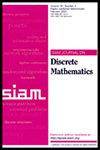[数学]-图中的模块
IF 1
3区 数学
Q2 MATHEMATICS
引用次数: 0
摘要
SIAM 离散数学杂志》,第 38 卷,第 1 期,第 566-589 页,2024 年 3 月。 摘要。模块分解的重点是反复识别模块[math]([math]之外共享完全相同邻域的顶点集合)并将其折叠为单个顶点。这种邻域精确性的概念非常严格,尤其是在处理现实世界的图形时。我们研究了放宽这一精确性条件的新方法。然而,推广模块分解远非易事。之前的大多数提议都失去了模块的代数特性,因此也失去了大多数好的算法结果。我们引入了[math]模块的概念,这种放宽保留了部分代数结构。它带来了一种具有有趣特性的新组合分解。在这项工作的主要成果中,我们证明了最小[math]模块可以在多项式时间内计算,并对图之间的串联和并联操作进行了概括。这导致了具有有趣性质的[math]图。我们研究了如何推广与[math]情况相对应的伽来定理,但不幸的是,我们给出的证据表明,计算这样的分解树可能很困难。本文章由计算机程序翻译,如有差异,请以英文原文为准。
[math]-Modules in Graphs
SIAM Journal on Discrete Mathematics, Volume 38, Issue 1, Page 566-589, March 2024.
Abstract. Modular decomposition focuses on repeatedly identifying a module [math] (a collection of vertices that shares exactly the same neighborhood outside of [math]) and collapsing it into a single vertex. This notion of exactitude of neighborhood is very strict, especially when dealing with real-world graphs. We study new ways to relax this exactitude condition. However, generalizing modular decomposition is far from obvious. Most of the previous proposals lose algebraic properties of modules and thus most of the nice algorithmic consequences. We introduce the notion of an [math]-module, a relaxation that maintains some of the algebraic structure. It leads to a new combinatorial decomposition with interesting properties. Among the main results in this work, we show that minimal [math]-modules can be computed in polynomial time, and we generalize series and parallel operation between graphs. This leads to [math]-cographs which have interesting properties. We study how to generalize Gallai’s theorem corresponding to the case for [math], but unfortunately we give evidence that computing such a decomposition tree can be difficult.
Abstract. Modular decomposition focuses on repeatedly identifying a module [math] (a collection of vertices that shares exactly the same neighborhood outside of [math]) and collapsing it into a single vertex. This notion of exactitude of neighborhood is very strict, especially when dealing with real-world graphs. We study new ways to relax this exactitude condition. However, generalizing modular decomposition is far from obvious. Most of the previous proposals lose algebraic properties of modules and thus most of the nice algorithmic consequences. We introduce the notion of an [math]-module, a relaxation that maintains some of the algebraic structure. It leads to a new combinatorial decomposition with interesting properties. Among the main results in this work, we show that minimal [math]-modules can be computed in polynomial time, and we generalize series and parallel operation between graphs. This leads to [math]-cographs which have interesting properties. We study how to generalize Gallai’s theorem corresponding to the case for [math], but unfortunately we give evidence that computing such a decomposition tree can be difficult.
求助全文
通过发布文献求助,成功后即可免费获取论文全文。
去求助
来源期刊
CiteScore
1.90
自引率
0.00%
发文量
124
审稿时长
4-8 weeks
期刊介绍:
SIAM Journal on Discrete Mathematics (SIDMA) publishes research papers of exceptional quality in pure and applied discrete mathematics, broadly interpreted. The journal''s focus is primarily theoretical rather than empirical, but the editors welcome papers that evolve from or have potential application to real-world problems. Submissions must be clearly written and make a significant contribution.
Topics include but are not limited to:
properties of and extremal problems for discrete structures
combinatorial optimization, including approximation algorithms
algebraic and enumerative combinatorics
coding and information theory
additive, analytic combinatorics and number theory
combinatorial matrix theory and spectral graph theory
design and analysis of algorithms for discrete structures
discrete problems in computational complexity
discrete and computational geometry
discrete methods in computational biology, and bioinformatics
probabilistic methods and randomized algorithms.

 求助内容:
求助内容: 应助结果提醒方式:
应助结果提醒方式:


